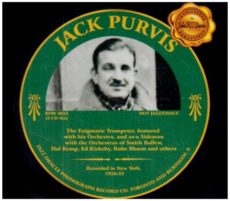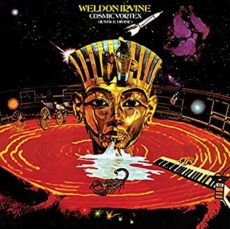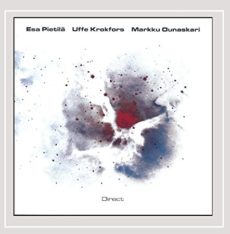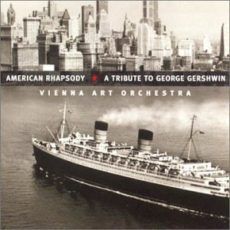
Daily Dose Of Jazz…
Jack Purvis was born John Purvis on December 11, 1906 in Kokomo, Indiana to Sanford B. Purvis, a real estate agent and Nettie Purvis. His behavior became uncontrollable after his mother’s death in 1912 and as a result of many acts of petty larceny, he was sent to a reform school. While there, he discovered that he had an uncanny musical ability, and soon became proficient enough to play both the trombone and trumpet professionally. This also enabled him to leave the reformatory and continue his high school education, while he was playing paying gigs on the side.
After high school he worked in his home state for a time then went to Lexington, Kentucky where he played with the Original Kentucky Night Hawks. In 1926 he was with Bud Rice touring New England, then with Whitey Kaufman’s Original Pennsylvanians. For a short time he played trumpet with Arnold Johnson’s orchestra, and by July 1928 he traveled to France with George Carhart’s band. In 1929 he joined Hal Kemp’s band and recorded with Kemp, Smith Ballew, Ted Wallace, Rube Bloom, the California Ramblers, and Roy Wilson’s Georgia Crackers. In 1929 Purvis led his own recording groups using Hal Kemp’s rhythm section to produce Copyin’ Louis, and Mental Strain at Dawn.
By 1930, Purvis leading a couple of racially mixed recording sessions including the likes of J.C. Higginbotham, and Adrian Rollini. One of these sessions was organized by Adrian Rollini and OKeh A & R man, Bob Stephens. He went on to work with the Dorsey Brothers and played fourth trumpet with Fletcher Henderson in a rehearsal capacity.
The early Thirties saw him played with a few radio orchestras and worked with Fred Waring, toured the South with Charlie Barnet, worked with the New Orleans Symphony Orchestra, moved to Los Angeles, California and was successful with radio broadcasting work. He worked for the George Stoll Orchestra, Warner Bros. Studios arranging, and composed Legends of Haiti for a one hundred and ten piece orchestra.
Living a checkered life he was in and out of jail, worked outside the musical environment working as a chef, a busker, an aviator in Florida, a carpenter, a radio repairman, a smuggler and a mercenary in South America. Trumpeter and trombonist Jack Purvis gassed himself to death in San Francisco, California on March 30, 1962.

Requisites
Cosmic Vortex – Justice Divine is the debut 1974 album by jazz pianist and keyboardist, Weldon Irvine. It explores the deeply spiritual and political landscape with a focus on lyrics and vocals in conjunction with elements of funk and improvisation.
Writing all of the compositions, Weldon included on this album Love Your Brother, Walk That Walk; Talk That Talk, Love Jones, I’ll Name It Tomorrow, Cosmic Vortex (Justice Divine), Quiet (In Memory of Duke Ellington), Let Yourself Be Free and Love Your Brother (Sanctified Version)” 1:30
To execute the task of giving this project life, along with himself on keyboards, soprano saxophone and vocals Irvine brought to the session Henry Grate, Jr., Cornell Dupree and Joe Caro on guitar, Bob Cranshaw, Gordon Edwards and George Murray on bass, Wesley “Gator” Watson, Jimmy Young, Lenny White and Chipper Lyles on drums, Napoleon Revels on percussion, Bud Johnson, Jr. on the congas and bongos, Gene Jefferson on tenor saxophone, Jimmy Owens, Roy Roman and Everett “Blood” Hollins on the trumpet, Bill Barnwell on flute, and on vocals he enlisted the talents of Nalo and Ojuleba.
More Posts: collectible,piano
Daily Dose Of Jazz…
Pops Mohamed was born Ismail Mohamed-Jan on December 10, 1949 in Benoni, Gauteng, South Africa. His career in music was the logical outcome of an early exposure at Dorkay House to the likes of Abdullah Ibrahim and Kippie Moeketsi. He started his first band The Valiants at 14.
Known by fans as the Minister of Music, Pops plays a wide variety of instruments, African mouth bow, bird whistle, berimbau, didgeridoo, guitar, keyboard, kora, and the thumb piano. He is also known for his wide range of musical styles which include jazz, kwela, pop, and soul. He produced Finding One’s Self, the late Moses Taiwa Molelekwa’s award-winning album.
His recorded his debut album Kalamazoo in 1991 and has since recorded eleven more, his last to date being 205’s Mood Africa. He performs regularly with and sits on the board of the Johannesburg Youth Orchestra Company. Multi-instrumentalist, jazz musician and producer Pops Mohamed, who plays the African mouth bow, bird whistle, berimbau, didgeridoo, guitar, keyboard, kora, and the thumb piano, continues to pursue his career in music.
More Posts: African mouth bow,berimbau,bird whistle,didgeridoo,guitar,keyboard,kora,thumb piano

Daily Dose Of Jazz…
Esa Pietilä was born on December 9, 1964 in Finland and started learning the saxophone as a youth, taking his inspiration from Eric Dolphy, Albert Ayler, Ornette Coleman and John Coltrane. He studied saxophone and composition in the Sibelius- Academy jazz department in Helsinki and privately in United States with David Liebman.
Pietilä started his career as a jazz musician and later on expanded his expression to many different musical genres. Performing with his jazz groups Liberty Ship and Esa Pietilä 3, he also has duo collaborations with contemporary classical & new music chamber musicians, and has soloed with chamber orchestras and other larger ensembles. He performs totally free improvisations at his solo concerts.
He has worked with conductors Esa-Pekka Salonen, Santtu-Matias Rouvali, with Avanti! Chamber Orchestra. Esa has premiered the saxophone concerto of Kalevi Aho, Eero Hämeenniemi and Pietilä´s concerto Graffiti Play for chamber orchestra & contemporary jazz trio.
His jazz collaborators have been Paal Nilssen-Love, Harvey Sorgen, Michael Jefry Stevens, Mathias Eick, Jeff Siegel, Karl Berger, Mark Helias, Brian Melvin, Heiri Kaenzig, Christoph Baumann, Baenz Öster, Franziska Baumann, Mike Nock, Ron McClure, Claudio Fasoli, Anders Begcrantz, Odean Pope, Hilmar Jensson, Raoul Björkenheim. Markku Ounaskari, Ulf Krokfors, Iro Haarla.
Saxophonist and composer Esa Pietilä, who in his home country, received the Yrjö Jazz award in 2016 for his original, genre-defying work in the field of avant-garde jazz, continues to work diversely in the field of contemporary music.
More Posts: saxophone

Daily Dose Of Jazz…
Mathias Rüegg was born on December 8, 1952 in Zurich, Switzerland and began playing jazz in secondary school. Trained as a schoolteacher, he taught for a while in special-needs schools. From 1973 to 1975 he attended the Musikhochschule in Graz, Austria, studying classical composition and jazz piano. In Vienna, Austria he performed in a nightclub as a solo jazz pianist, joined later by saxophonist Wolfgang Puschnig. The duo formed the core of an ensemble that became the Vienna Art Orchestra in 1977.
Rüegg’s distinctive, often humorous compositions have drawn on a range of influences from traditional folk music to classics. He has also led the VAO to explore the big band repertory of American jazz composers such as Duke Ellington. Beyond the traditional big-band complement, his orchestrations have prominently featured such instruments as the tuba, piccolo, bass clarinet, alphorn, exotic percussion, and wordless vocals.
Mathia has composed hundreds of pieces for the Vienna Art Orchestra, other European big bands, and classical orchestras, as well as theatre music and film music. Since 1994 he has composed several works for soloist and chamber orchestra.
Besides managing the VAO, Rüegg has conducted workshops in Europe, worked as artistic director for music festivals, and headed multimedia and music-related projects. From 1983 to 1987 he was the director of the Vienna Art Choir. He founded the Porgy & Bess music club in Vienna and the Hans Koller Prize for Austrian jazz.
Pianist, composer, director and bandleader Mathias Rüegg continues to pursue his career in a variety of musical endeavors.
More Posts: piano






